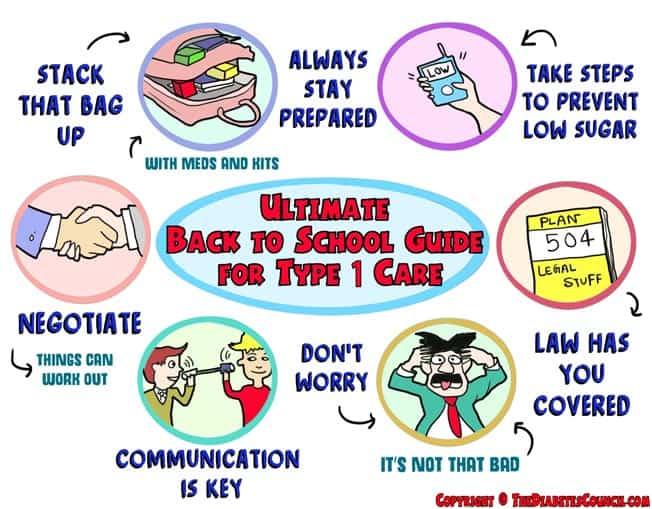
One of the biggest fears that many parents of newly diagnosed parents and even veteran parents of Type 1 kids is back to school time. School represents a long period of time that parents are not able to be with their kids and many parents have difficulty excepting this. They want to ensure their children are safe and school is an unknown.
For many students, the beginning of the school year involves getting their school supplies together and picking their back to school outfit. But while kids with diabetes have these same woes, there is much more to the start of the school year. Parents can put their minds at ease with the proper planning and communication with school staff. Teachers, the nurse, and parents are a team that must work together to ensure the safety of the child at school.
Contents
Preparing for School

You will want to make sure your child always has everything on them they need to manage their diabetes when they are at school. This includes their supplies as well as items to prevent and even treat low blood sugars. In order to help them prepare, have them put together a ‘low’ pack in a bag to take to school with them. Items they can include are:
- Glucose tablets, or glucose gel
- 2 juice boxes up to 15g of carbohydrates
- An emergency hypoglycemia plan
Tips for School Staff and Parents
Teachers, coaches, office staff, nurses and other school employees all play a huge role in helping children manage their diabetes when they are at school. With the proper communication and teamwork together all members can help provide assistance to your child and support while they are away from you.
Help your child’s teacher, the school nurse and other members of the staff who may come in contact with your child must learn to recognize the signs of hypoglycemia. This is very important because a low blood sugar can happen at any time. It is also important to ensure your child is involved in their diabetes management too. This will depend on their age and maturity level and young children will still require the assistance of caregivers and school staff, but as they get older, the role in their care will change.
What to Expect in Children to Prevent a Low Blood Sugar
- Preschoolers: Will need to rely heavily on their school caregivers with their diabetes management. They have difficulty recognizing the symptoms of a low blood sugar. Helping to guide them with how they are feeling when they are experiencing lows can help teach them what a low blood sugar feels like.
- Grade School thru Middle School: Those in these grades will begin to take on more responsibility for their diabetes management. Many kids in this group can perform many independent diabetes management skills, but they will still require support and help from teachers and staff members.
- High Schoolers: High school is often a time when teenagers struggle with their independence when it comes to diabetes management. As a parent it’s important for you to work with your teen to help guide them into this role. Teachers and school staff members will still play a role in the diabetes care team for teenagers at school.
Don’t Worry
When your child with type 1 diabetes is about to go back to school the first thing you want to do is remember not to worry. The school probably has other children or those who have come through the school with diabetes. If they do not, the diabetes care team is there to help meet all your child’s medical needs. To ease everyone through the transition of going back to school there are a couple things you can do:
- Schedule a School Meeting: you will want to set up a time and date with the school to create the best possible care plan for your child. Those in attendance will include the school nurse, the principal, members of the healthcare team, and teachers. The goal is to talk about your child’s diagnosis and their needs. At this meeting you can work to establish a DMMP (Diabetes Medical Management Plan) for your child. This is a plan that will allow the caregivers at the school to know what the treatment regimen for school is.
- Schedule a 504 Meeting: Type 1 diabetes is considered to be a disability under federal law. This means that the school is required to accommodate any special needs your child may have. Creating a 504 plan will help make it official to the school district that your child in fact does have Type 1 diabetes and lay out what they can do to help ensure they thrive in school.
What is a 504 Plan?
A 504 plan refers to a type of plan the was created to help meet the requirements under federal law to ensure no discrimination for individuals with disabilities. This law is section 504 of the Rehabilitation Act of 1973.
A 504 plan will set out the steps and actions your school must take to make sure your student is kept medically safe while at school, that they have the same educational opportunities as other kids and are treated fairly. It is a plan that can help make sure everyone understands their responsibilities to help reduce any misunderstandings.
What to Include in a 504 Plan?
All plans should be tailored to the individual needs of your child, their abilities for self-management, and treatments. It is important to make sure you include provisions that are only relevant to your child. You can change these provisions each and every year to suit their growing and maturing needs. All plans should state that school staff members must always be trained to recognize the signs of high and low blood sugar and to respond to the treatment for these laid out in their DMMP.
Types of 504 Plan Provisions
- All school staff members who interact with the student on a frequent basis should know how to recognize both high and low blood sugar symptoms and treat accordingly.
- Self-managing students should be allowed access to self-manage anywhere, and always keep their supplies with them.
- Students should be allowed full participating in all extracurricular activities and sports, as well as field trips.
- Parents should be permitted to accompany their child on field trips, if they are not able to arrange to do so a nurse must attend.
- Permission should be given to include any extra trips to use the restroom or the water fountain.
- Request that they are allowed to keep a water bottle on them at all times.
- Permission for excused absences for appointments or sick days should be given without any penalty.
- Arrangements for missed classroom time due to treatment of high or low blood sugar, or other missed time should be made.
- In the event of an emergency you should establish a plan of action when to alert you.
Attendance Accommodations at School
Children who have diabetes should still be able to attend school on a regular basis. In a perfect world, your child wouldn’t have to stay home from school for any diabetes related instances. It is important though that their absences only happen if they are medically necessary. When they do happen you still want to ensure there is no unfair consequences.
I highly advise reading the following articles:
If you find that your child has to miss school or class time frequently because of difficulties managing high or low blood sugars it may be time to speak with your diabetes care team and doctors for a change to their regime.
Children’s Rights in Regards to Accommodations for School Attendance
Children who miss school and class time for any diabetes related issues are entitled to certain accommodations under the Section 504 federal law. Here are some tips for understanding student attendance accommodations:
- Teachers and the school may not reduce a grade for any missed class time due to time needed to manage or take care of a diabetes issue.
- Students are permitted to make up work for any missed time they are out of school or classes due to diabetes issues.
- No punishment may be given for any absence related to diabetes issues such as a detention.
- If your school does have already established guidelines for reporting absences as well as medical documentation they can require that you do still, follow these guidelines.
How to Handle Accommodation for Absences in your 504 Plan
You will want to plan ahead and double check that their 504 plan ensures they will be excused from school for any diabetes related absences. Some examples of these include:
- Difficulties with blood sugar management
- Presence of Ketones and Treatment of these
- Physician Appointments
Be sure to ask your diabetes care doctor to write a medical order for reasons why the student may be absent from school for diabetes issues. Some schools will limit the total number of times that a parent may write an excuse. If your school has this rule you must keep track of how many excuses, you have written. If they reach that allotted number, then you can obtain an excuse from your diabetes care doctor.
Ensure Communication with the School
When your child is absent from school be sure to follow up with the attendance office to find out if they got the excuse you sent in. Keep a record of the dates your child is absent, the reason that they were not in school and even a picture of their blood sugar meter during this time. Don’t forget to include a copy of the doctor’s excuse. Check with your child’s teacher ahead of time, maybe in the 504 plan meeting to create a plan that allows your child to make up any work they miss due to absences.
Testing Accommodations for Diabetes
Students that have type 1 diabetes still have the right to get accommodations to their education, this includes testing. However, when standardized testing occurs, it may be necessary to request such accommodations ahead of time. They can be simple or more complex.
Elementary and Secondary Schools
Schools that receive federal funding are required to ensure students with diabetes still receive reasonable accommodations under the section 504 of the Rehabilitation Act of 1973.
College and Post-Secondary Education
No matter the level of education, school officials are prohibited from discrimination students with disabilities. This is a protection under the Americans with Disabilities Act. They must make reasonable accommodations such as extra time for exams like the SAT, LSTAT, GRE, and ACT when they miss time due to diabetes management.
Example Accommodations
Even simple accommodations may need to be requested. If your college prohibits the use of electronic devices you may want to request use of your insulin pump. Additional accommodations can include
- Having a blood sugar meter on hand
- Access to snacks on hand for low blood sugars
- Ability to take an extended break for diabetes care
Field Trips and Extra Curricular Activities
Students are busy today, it seems like they live for school and don’t come home until it’s bed time. Education is a full world experience; it doesn’t just take place in one classroom. They take field trips to many educational sites. Students may also opt to be involved in extracurricular activities at school.
Because of these extra school events it’s important to ensure the proper accommodations for your student. Careful planning is where it starts as well as a few adjustments to your student’s normal routine. Here is some advice on how to handle field trips and extracurricular activities:
- Additional Supplies: You may want to send another set of supplies so that they have access to their diabetes equipment at all times.
- Adjusting Schedules: Field trips and activities may require you to adjust your students schedule if lunch or snack times occur at different times than normal. Also students may be more active during these times which means adjustments in their regime due to activity levels may be needed.
Resolving Diabetes Care Issues at School
Sometimes, as hard as we plan, there may be some miscommunication or misunderstandings about the care of your child while they are at school. When this takes place, you will want to first remind yourself that resolving the problem is in the best interests of your child. Learning to work together as a team can help ensure your child is safe at all times. There are a few steps you can follow to help ensure this process goes smoothly, these steps include:
- Education
- Negotiation
- Litigation
- Legislation
Education
You want to start first by educating yourself about the rights your child has when they are at school. You can find this information here on the American Diabetes Association website. You will then want to educate the people who may be stopping or preventing your child from receiving the right care at school. Sometimes the root of these issues is ignorance and misinformation about diabetes. Parents usually find that when they are able education decision makers at the school about their child’s diabetes and their rights that the issues they are having are usually resolved rather quickly.
Here is some advice:
- Talk to the school administrators and all staff members about what diabetes means for your child. Some school staff members may have never met a child who has type 1 diabetes.
- It is also important to teach staff members the difference between type 1 and type 2 diabetes and how it may differ from what a family member has.
- Work together with the nurse and school administrators to gather and distribute training information
Negotiation
When education isn’t all you need to solve your issues, you may need to go to the next step and negotiate. You will want to first make the assumption that everyone at the school just means well and wants only what is best for your child. Working with the school to come to an agreement really is what is best overall. But it doesn’t mean that you have to compromise their safety or even the abilities they have to participate in school.
Here is some advice:
- Make sure your tone is that of respect. Even if you are not happy with how the school is handling the situation you still want to set an example that treating others right when you are not happy with their decisions is the best way you can resolve the situation.
- Listen to the schools concerns and communicate your concerns to them clearly.
- Take a list of talking points along with you, this will help if you are nervous for the meeting
- When there is a disagreement, ask the staff member why they have the opinion they do.
Litigation
It is your right to make an administrative complaint or even file a lawsuit. Both of these ways can be effective to make sure your child’s rights are defended and no laws are being broken. It’s important to note that you should only consider these options after educating and negotiating with the school has failed.
Administrative Complaint
This is the in between part of negotiating with the school and actually filing a lawsuit. These complaints are able to be made free of charge to the Department of Education, Department of Justice and other agencies. The procedures on how to submit your claim can be found in the IDEA, Individuals with Disabilities Education Act.
Further reading:
Lawsuit
A smaller number of parents have to defend their children’s rights by filing a lawsuit. This is usually the best case of action when everything else has failed. Before you make the decision to file one you should consider:
- The outcome of the case. If you lose this could set a precedent that you don’t want in the school district or your county. While it may hurt your child, it has the potential to hurt other kids too.
- Court proceedings are time consuming and can take up to years to get worked out.
- Negative effects of a court hearing could have a bad effect on relationships with the school. If you file a lawsuit your chances at resolving things in a friendly manner may be lower.
Legislation
Sometimes the problem with school issues and diabetes is because of an outdated law. These are what parents see as some of the most common reasons there is not fair treatment across the board. Some state laws even prohibit insulin and glucagon administration by anyone other than the nurse. While some may not prohibit this but are unclear as to what should take place.
To help address these issues and make it easier for parents and children in the future, you can help lead a state effort to make sure all students who have type 1 diabetes are treated fairly and are medically safe while at school. Becoming a diabetes advocate can be very rewarding all around. Hope this helped you make better decisions as a parent.
TheDiabetesCouncil Article | Reviewed by Dr. Christine Traxler MD on May 26, 2020











